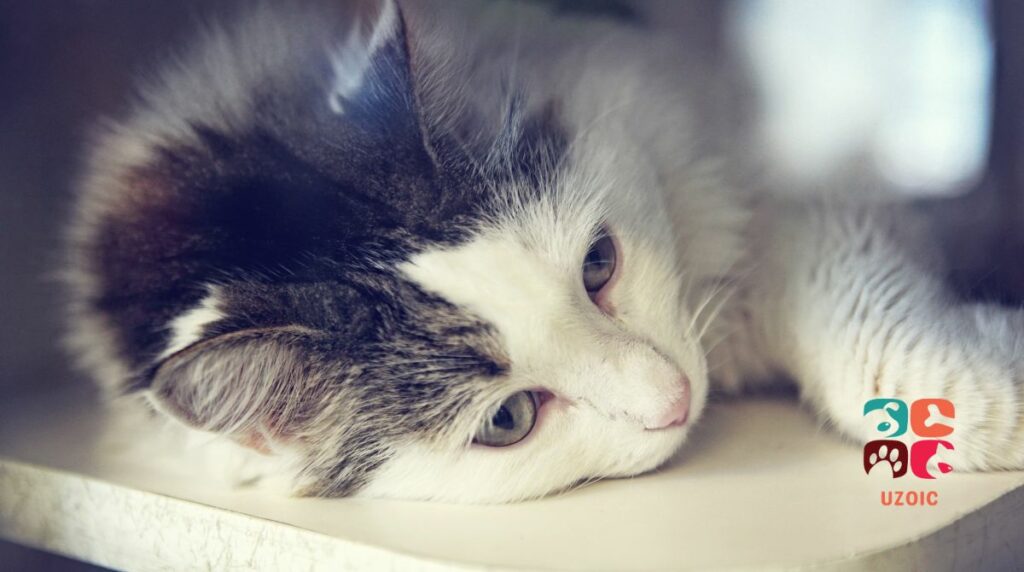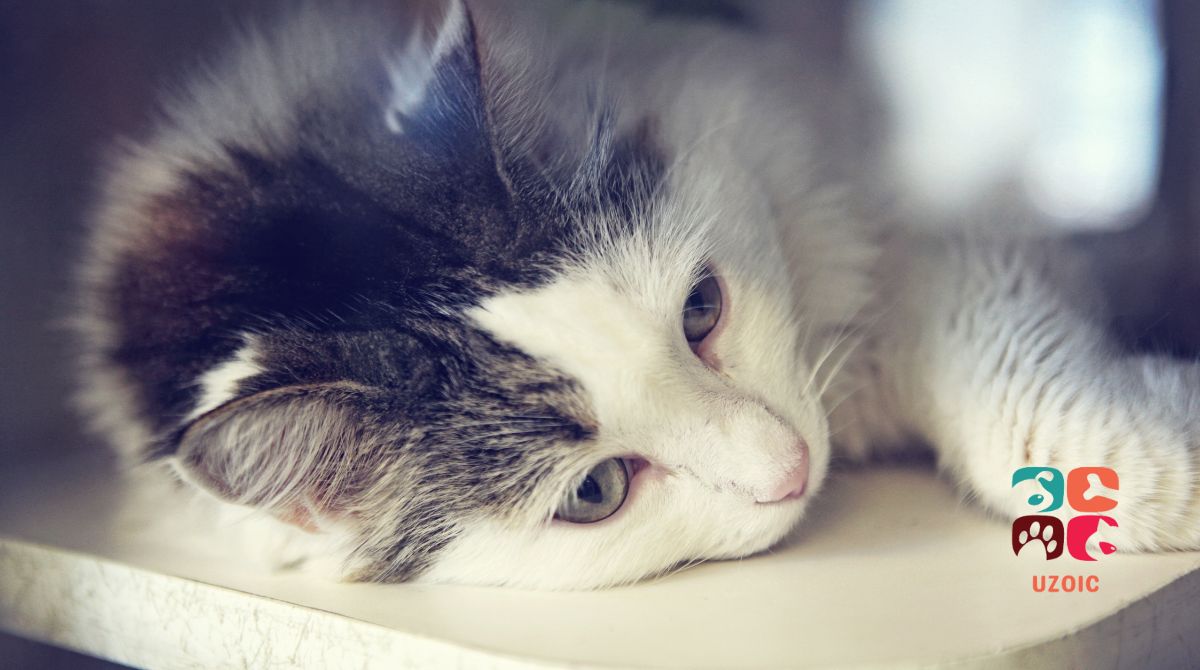It’s not always easy when you get a new kitten, and your older cat seems to become depressed. Your older cat may have been the dominant one in the home before and now feels like she has lost her place. You may be wondering how to deal with cat depression after getting a new kitten. Here are some tips that can help!
When you get a new kitten, it’s natural to be excited. But what if your excitement turns to sadness when your older cat doesn’t like the new addition to its space? Don’t worry; you’re not alone. Your older cat may feel down if you’ve just brought a new kitten into your home. Cats can get jealous and experience depression after a new pet enters the house.
Many cats experience this type of depression, but there are ways to deal with it. We’ll discuss some of the most helpful ways to cope with cat depression after getting a new kitten. Keep reading for more information!
Table of Contents
Can A New Kitten Make My Cat Depressed?

Yes, a new kitten can make your cat depressed. Cats are very territorial animals and love having their own space. Therefore, when a new kitten comes into the home, it can disrupt your cat’s routine and create a feeling of anxiety. In addition, the new kitten may not be well-socialized and could be intimidated by your cat. This can lead to your cat feeling isolated and depressed.
Cats are creatures of habit and can become very attached to their routine. So, when a new kitten comes along and disrupts that routine, it’s not surprising that your cat might start to feel a little down. It may take some time for your cats to adjust to the new addition, but eventually, they will learn to coexist peacefully.
A kitten can make an adult cat feel jealous and may even depress them. Therefore, it is important to give your cat attention and spend time with them when introducing a kitten into the home. A kitten will usually adjust quickly to a new home and enjoy the company of other cats, but an adult cat may need some time to warm up to its new feline friend. If your cat seems depressed or down after the arrival of a new kitten, try spending extra time playing with them, petting them, and giving them attention. In most cases, they will eventually adjust and start to enjoy having a little companion around the house.
What are the Signs of Cat Depression After a New Kitten?
As you embark on this exciting journey of cat parenthood by adopting a new kitten, it’s important to be aware of the potential for depression in your older cat. After all, a new kitten can be a big adjustment for an established cat. Here are some signs to look out for that may indicate your cat is feeling depressed:
Loss Of Appetite
One of the most common signs of depression in cats is a loss of appetite. So if your cat is eating less than usual or has stopped eating altogether, this may be a sign that they are feeling down.
Change In Sleeping Patterns
If your cat is sleeping more than usual or having difficulty sleeping, this may be a sign of depression.
Lower Energy Levels
One of the most common signs of depression is a change in energy levels. If your cat seems more tired than usual or has less energy than before, it may be a sign that they are feeling down.
Avoiding Social Interaction
Cats may become more withdrawn and start spending less time socializing with family members when they are feeling down. If your cat seems uninterested in playing or being around people, it may be depressed due to the new kitten.
Changes In Grooming Habits
Cats typically groom themselves several times a day. It is one of their favorite activities. However, when feeling down, they may stop grooming altogether or over-groom to the point of balding.
Vocal Cues
You may notice increased vocal communication from your older cat when they are feeling depressed. For example, they may meow more than usual or make other vocalizations that are out of the ordinary.
What Causes Cat Depression After a New Kitten?
There are several reasons why your cat may start to feel depressed after you bring a new kitten into the house. Here are some of the most common causes:
Loss Of Attention
One of the most common reasons for cat depression is a loss of attention from their guardians. When you first bring a new kitten home, it’s natural to want to spend all your time doting on the little one. However, this can leave your older cat feeling neglected and can cause them to become depressed.
Loss Of Social Interaction
Another common cause of cat depression is a loss of social interaction. When you first bring a new kitten home, they will likely spend most of their time sleeping. This can leave your older cat feeling bored and lonely.
Loss Of Status
In many cases, cat depression is caused by a loss of status. For example, when a new kitten comes into the house, your older cat may feel like they are no longer the center of attention. This can be a difficult adjustment for some cats and can lead to depression.
Loss of Territory
Another common cause of cat depression is a loss of territory. When a new kitten comes into the house, they will likely have free reign of the house while your older cat is relegated to the sidelines. This can be a difficult adjustment for some cats and lead to depression.
If you notice any of these changes in your older cat, it’s important to take action.
How to Prevent Cat Depression After a New Kitten
You can do a few things to prevent cat depression after bringing a new kitten home. One of the most important things is to ensure you continue giving your older cat attention.
Spend time playing with them, petting them, and talking to them. It’s also important to give them plenty of opportunities to socialize with the new kitten. Give them both time to adjust and get used to each other’s presence. Finally, ensure you provide plenty of food, water, and separate litter boxes. A comfortable environment will help your cats adjust to the new addition to the family.
Spend some extra time playing with and petting your older cat, and give them their own unique toys and spots in the house. With a little patience and love, you can help your cats adjust to their new life together and enjoy all the benefits of being part of a multi-cat household.
How To Deal With Cat Depression After A New Kitten!
If your cat seems depressed after bringing a new kitten home, you can do a few things to help them adjust.
Extra attention and affection:
- Spend extra time playing with and petting your older cat.
- Give them their special toys and spots in the house.
- Let them know that they are still loved and valued.
Create opportunities to socialize: Give your cats plenty of opportunities to socialize. For example, allow your older cat to approach the kitten on their own terms. If they hiss or growl, don’t punish them – this is just their way of communicating with the new arrival.
Provide Individual Space: Do not try to take space from your older cat. Instead, create a new space for the kitten meaning separate beds, litter boxes, food, and water bowls.
Give Plenty Of Toys: Provide plenty of toys and scratch posts to keep your cat occupied and distracted from the newcomer.
How Do I Get My Resident Cat To Like My New Kitten?
If your resident cat is having a hard time adjusting to the new kitten, there are some things you can do to help them get along. One way to help your resident cat adapt to a new kitten is by giving them their food and water bowls and separate litter boxes. This will help your resident cat feel like they still have their own space and territory.
You should also give your resident cat plenty of attention and love, so it does not feel left out or neglected. Avoid forcing your resident cat and kitten to interact too much at first; let them approach each other on their terms. With time and patience, your resident cat and kitten will likely become best friends.
How Do I Stop My Older Cat From Attacking My New Kitten?
If your older cat is attacking your new kitten, it’s important to take action immediately. Cat aggression can be dangerous and should not be tolerated.
First, try to determine the root of the problem. If there is a resource that they are competing for (such as food, water, or toys), make sure to provide enough for both of them.
Secondly, provide plenty of places for them to hide and escape if they feel threatened. This will help reduce the stress levels for both of your cats.
Finally, consult with a veterinarian or animal behaviorist to get professional help dealing with your cat’s aggression.
How Long Does It Take For My Cat To Adjust To A New Kitten?
It typically takes a couple of weeks for a cat to adjust to a new kitten. However, the adjustment period can vary depending on the age and temperament of your cat. If your cat is younger or more energetic, they may be more curious about the new addition and take less time to adjust. On the other hand, older cats or those with a more laid-back personality may be more hesitant and take longer to warm up to the new kitten. Ultimately, giving your cat time to get used to their new furry friend at their own pace is essential.
It can take some time for a cat to adjust to a new kitten in the home. It is generally best to slowly introduce the two animals to each other over several days. This will allow them to get used to each other’s smells and sounds.
During this time, provide both cats with plenty of hiding spots and perches where they can feel safe. Then, once they have had a chance to get acquainted, most cats can share their home peacefully.
However, some cats may never fully accept a new feline addition to the family and may need to be kept separate.
How Do I Get My Cat to Accept a New Kitten?
The best way to get your cat to accept a new kitten is to introduce them to each other slowly. Start by keeping the kitten in a separate room for a few days to get used to each other’s smells.
Then, try letting them see each other for short periods while separated by a barrier, such as a baby gate.
Finally, allow them to interact with each other supervised until you feel comfortable that they won’t hurt each other.
It may take some time and patience, but eventually, most cats will be able to get along.
Introduce them gradually
When bringing your new kitten home, keep them in a separate room from your resident cat. This will give them time to get used to each other’s smells. Then, after a few days, try letting them see each other for short periods while separated by a barrier, such as a baby gate.
Provide plenty of toys and space for them to play
One of the reasons cats may fight is because they compete for resources, such as food, water, or toys. Make sure to provide enough for both of them and create a space where they can have their own territory.
Reward positive behavior
Whenever your cats are peacefully coexisting, make sure to praise them and give them a treat. This will reinforce the behavior you want to see and help them associate being around each other with something positive.
Be consistent with your rules
It’s important to be consistent with your expectations for both cats. For example, if you allow one of them on the bed but not the other, they will quickly learn that fighting gets them what they want.
Don’t give up if it takes a while – cats can be fickle!
Cats are notoriously fickle creatures, so even if it seems like they will never get along, don’t give up hope. With time and patience, most cats will eventually be able to learn to tolerate or even enjoy each other’s company.
Will My Cat Hate Me If I Get A New Kitten?
No, your cat will not hate you if you get a new kitten. In fact, cats are very adaptable and typically take the new addition in stride. However, there may be a period of adjustment as they get used to the new animal in the home. Giving your cat plenty of attention and affection is vital to help them feel secure. But, with some time and patience, your cat will soon return to its normal self.
Is My Cat Stressed By My New Kitten?
During the first few weeks that you have a new kitten, it’s normal for your cat to feel some stress. This is because they are trying to adjust to the new animal in the home and establish their place in the hierarchy.
There are a few things you can do to help reduce your cat’s stress during this time:
- Ensure to provide plenty of resources such as food, water, toys, and scratch posts.
- Give them time to adjust and get used to each other’s scent. Do not force them to interact if they are not ready.
- Provide plenty of love and attention to both of your cats to feel equally loved and valued.
With a little time and patience, your cats will soon be best friends.
Is It Normal For My Cat To Growl At A New Kitten?
It’s not unusual for a cat to be growling at a new kitten. Your cat may be feeling threatened by the new arrival and is trying to assert dominance. In most cases, the growling is simply a way of communication and is not indicative of aggressive behavior. Instead, it is their way of showing that they are the boss.
While it may be alarming to hear your usually docile cat growling at a new kitten, it is normal behavior. Cats are very territorial creatures, and introducing a new kitten can be seen as a threat to their territory. The good news is that, in most cases, the growling is simply a way for your cat to assert dominance over the new kitten. The two will likely develop a strong bond with time and patience and become lifelong friends.
In the meantime, give your cat extra attention and affection to help ease their anxiety. And if the growling persists or escalates into aggression, it’s best to consult with your veterinarian for guidance.
Conclusion
This brings us to the conclusion of our topic on how to deal with cat depression after a new kitten. Getting a new kitten is an exciting time for any cat owner. However, your cat may need some time to adjust to its new friend. Most cats adjust easily and will love the new addition to the family. If you have any concerns about your cat’s behavior, it’s best to consult with your veterinarian for guidance. Thanks for reading!
Also read:
- How To Treat Cat Dandruff With Olive Oil?
- My Cat’s Ear Tip is Drooping: What Could Be Wrong?
- Why Is My Cat Literally Obsessed With Me?
- My Cat Ate a Feather! What Should I Do Now?
- Why Is Your Stray Kitten Not Eating?
- How Do I Get Rid Of My Cat’s Black Eye Crust?
- When Should I Let My Kitten Roam The House?
- Is It Cruel To Have Only One Cat?
- Why Does My Mother Cat Bite Her Kittens?


